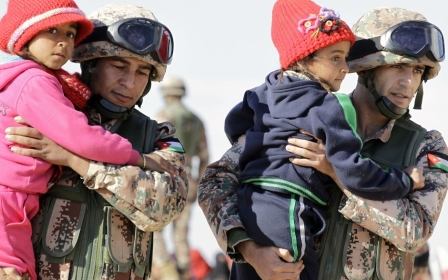The politicisation of aid at Syria's donor conference in London

The Syria donor conference held in London on Thursday aims to address the needs of some six million people displaced within Syria, and over four million refugees in other countries, by obtaining pledges from the international community for $9 billion.
The pledges are happening as the "Geneva talks," aimed at reaching a political solution to the crisis, reached a stalemate, with the Syrian regime intensifying air strikes against rebel territory in the countryside around Aleppo, while the opposition said it would not officially join talks without improved humanitarian conditions, including the release of political prisoners, an end to indiscriminate shelling and aid reaching besieged areas.
Although UN special envoy to Syria, Staffan de Mistura, insists the suspension of talks until 25 February reflects a "temporary pause, not failure," the head of the opposition’s High Negotiations Council, Riad Hijab, has warned his team would not return to Geneva if conditions were not met, while the Syria government delegation also refused to officially start talks over concerns some opposition leaders are what it labels "terrorists". In other words, the political process has reached a seeming impasse.
In this context, the commitment to provide aid to Syria’s displaced seems like a welcome attempt to remedy a complex and seemingly intractable problem. Indeed, Syria has been described by representatives from the United Nation's major agencies in Damascus as the most "disastrous humanitarian situation in the 21st century" and is currently deemed by UNICEF one of the most dangerous countries to be a child.
But there is also some skepticism surrounding this year’s pledges. For a start, past aid conferences for Syria have failed to deliver - last year's raised just half of its target. And of the 3.8 billion dollars pledged in 2015, UN sources say $8.4 billion was needed to cover the cost of humanitarian aid – a drop in the proverbial ocean and one which has left Syrians in refugee camps living in acute poverty and misery.
In just the last two weeks, scores of refugees have died in a remote camp on the Jordanian border, as winter storms, injuries, malnutrition and disease take their toll.
What’s more, even if the aid pledges are met, there are no guarantees the aid itself can be delivered. Almost half a million Syrians are currently living under siege and sieges have become a key weapon of war employed by the regime, rebel forces and Daesh.
According to the UN, almost 75 percent of its requests to the government to deliver aid have gone unanswered. And the delivery of aid itself has become caught up in the political imbroglio, with the UN recently accused of politicising aid, after it emerged it knew about the desperation in the besieged town of Madaya, but opted to avoid highlighting it due to fraught relations with the regime.
The politicisation of aid was further highlighted by the UK’s pledge, which focused on the provision of aid to provide jobs in transit countries, in order to persuade Syrians to stay in the Middle East. For many European countries, aid to Syrians is less about finding a long-term solution to the crisis and more about keeping Syrians out of Europe.
And this is where the very valid question must be posed as to whether these billions will indeed be used to end and not to prolong the war. Aid could potentially serve to reduce the acute misery and create a sense that the camps – meant to be temporary – can actually provide long-term living solutions for Syrians. But this ultimately only displaces the problem.
The Middle East has already had to cope with successive waves of displacement – Palestine, Iraq and now Syria, with the current scale of forced displacements, coupled with widespread political upheaval, a "historic turning point for the region, the likes of which have not been seen since the end of World War I," according to Maya Yahya, senior associate at the Carnegie Endowment.
The limbo currently experienced by many Syrians will not be redressed through merely improving the conditions of refugee camps, although that is clearly an urgent priority. To quote Amin Awad, the former head of the United Nations High Commissioner for Refugees (UNHCR) in the Middle East, speaking in 2014: "We cannot subsidise our political shortfalls by focusing purely on humanitarian assistance."
Ultimately the delivery of said aid to Syrians relies on access, something the current political situation renders near impossible. Surely any real and meaningful commitment to aid to Syrians would take seriously the ability to deliver the said aid to those it aims to assist.
What Syrians actually need is a political resolution to the current crisis which will allow them to return home, not patronising commitments to "special economic zones," a political shorthand for turning what are meant to be temporary refugee camps into more permanent encampments from which refugees will find it harder to leave, and harder to request asylum.
As the political will across Europe to welcome refugees hardens, aid shouldn’t serve as a means for Europe to desist from its responsibilities to provide asylum to those in need. Nor can any sum replace the value of the political will necessary to guarantee Syrians a viable future within their own country.
- Myriam Francois is a Franco-British journalist, broadcaster and writer with a focus on current affairs, France and the Middle East. You can follow her on Twitter @MyriamFrancoisC
The views expressed in this article belong to the author and do not necessarily reflect the editorial policy of Middle East Eye.
Photo: (L to R) German Chancellor Angela Merkel, the Emir of Kuwait, Sheikh Sabah al-Ahmad al-Sabah, and British Prime Minister David Cameron attend the 'Supporting Syria & The Region' donor conference at the QEII centre in central London on 4 February, 2016 (AFP).
Stay informed with MEE's newsletters
Sign up to get the latest alerts, insights and analysis, starting with Turkey Unpacked
Middle East Eye delivers independent and unrivalled coverage and analysis of the Middle East, North Africa and beyond. To learn more about republishing this content and the associated fees, please fill out this form. More about MEE can be found here.





